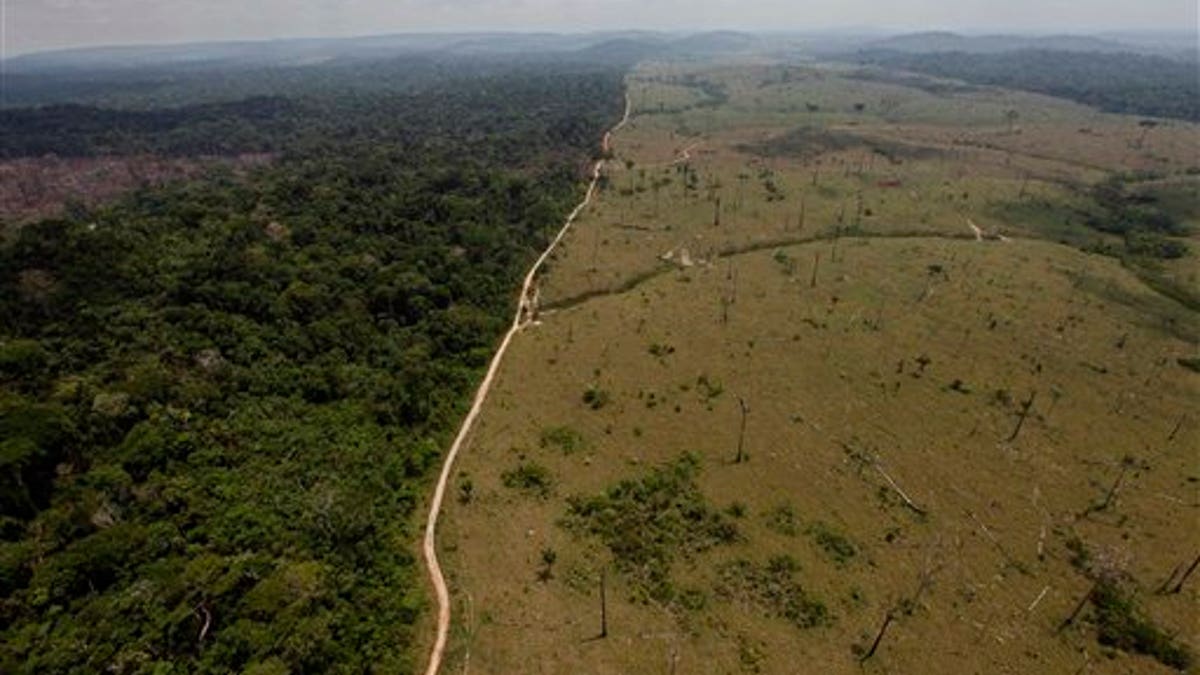
FILE - In this Sept. 15, 2009 file photo, a deforested area is seen near Novo Progresso, in Brazil's northern state of Para. The Brazilian Amazon is arguably the world's biggest natural defense against global warming, acting as a "sink," or absorber, of carbon dioxide. Brazilian legislators are pushing to resume debate Tuesday, May 24, 2011 on changes to an environmental law that watchdog groups warn will speed destruction of the Amazon rain forest. (AP Photo/Andre Penner, file)
RIO DE JANEIRO – In the 12-month period that ended last August, deforestation in Brazil increased in almost 30 percent.
It is an all-time record that has set off a loud alarm among scientists, environmentalists and everyone who knows that the region is not only the so-called “lung of the planet” but also home to about 2.5 million species of insects, tens of thousands of plants and about 2,000 birds and mammals.
According to the latest report by the National Institute for Space Research (INPE), the Brazilian agency that monitors deforestation, between July 2015 and August 2016 roughly 3,100 square miles went up in smoke mostly to give way to farmland and further cement the country’s position as the world’s top exporter of meat products.
INCREDIBLE PHOTOS OFFER GLIMPSE OF UNCONTACTED AMAZON TRIBE
Activists and experts agree that such depredation has been in large part possible to the loosening of the nation’s environmental laws and also to budget cuts that have left vast stretches of rain forest to the mercy of greed.
Cristiane Mazetti, a spokesperson for Greenpeace, said the Forest Code of 2012 brought about a sort of “deforestation amnesty” that contributes to the increase of tree felling by creating a sense of impunity.
She said the issue is hardly getting any government attention and that apathy seems to have taken over.
"We live a political moment in Brazil that puts the environmental issue in second, maybe third,” she told Fox News. “Congress spent a year focused on the impeachment vote of former President Dilma Rousseff and now prioritizes the approval of austerity measures. It has not allowed this issue to advance," she said.
STRANGE AMAZON MARKINGS BAFFLE EXPERTS
In addition, the allocation of funds for surveillance, monitoring and prevention has been dropping dramatically. In 2015 approximately $22 million were devoted to this end; in 2016 only $7 million were used for this purpose, according to the Environmental Ministry data.
To put an end to what some are calling an epidemic, in 2015 Greenpeace introduced a bill in Congress calling for a “zero deforestation policy.” It was filed along with 1.4 million signatures supporting the initiative.
The bill is currently in the consultation phase, which means the population has until the end of 2017 to issue opinions and recommendations.
Environmentalists hope that the new law will reinstate some of the regulations that they say protected the land. Before 2012, any tree-cutting had to be justified and explained by a number of government agencies. Today, all that is required is a single permit issued by the Ministry of Agriculture in a matter of weeks.
Greenpeace has dubbed Agriculture Minister Blairo Maggi “the largest forest destroyer in Brazil.”
EYE IN THE SKY: TECH HELPS PROTECT ISOLATED AMAZON TRIBES
According to Paulo Barreto, a researcher at the Instituto do Homem e Meio Ambiente da Amazônia (Imazon), the steady expansion of the country's farming borders is also being stimulated by an increase in cattle prices.
However, he said Brazil could still benefit from its oversized livestock – the largest in the world – without dilapidating the Amazon rain forest if “the government was vigilant, if it didn't change the rules. But when the [deforestation] threat increases and government weakens protection — that mix leads to this escalating situation," he said.
Large infrastructure projects in the Amazon region, such as the new Belo Monte Hydroelectric Plant, in the state of Para, have worsened the problem by “leading to a disorderly urban growth of the site, pollution and even the flooding of various areas," according to the Socio-Environmental Institute (ISA).
No wonder that in the INPE report released recently, Para is at the top of the list, with approximately 1,200 square miles (38 percent of the state) of deforested land in just 12 months.
Environmentalists say the magnitude of the threat demands a serious effort by the government and the world.
"There is also a lack of ambition to combat the problem,” Mazetti said. “Last year, the government set a goal to end illegal deforestation by 2030. But if we [continue to] allow this practice, admittedly illegal, for another 15 years, how can we achieve this goal?" she said.
